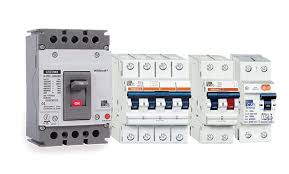
Different type of mcbs and rccbs and their usage
Different types of mcbs and rccbs and their usage
An electrical circuit breaker is a switching device that is activated automatically or manually to control and protect an electrical power system. The three main circuit breaker devices that are being used today are MCB (Miniature Circuit Breaker), RCCB (Residual Current Circuit Breaker), and RCBO (Residual Current Circuit Breaker with Overcurrent Protection). The others types of the circuit breaker are ELCB (Earth Leakage Circuit Breaker) and MCCB (Moulded Case Circuit Breaker).
Miniature Circuit Breakers (MCB)
They are used for overcurrent and short-circuit protection and they cannot detect residual current (earth leakage current) unless it is an overload or short circuit. They are the most widely used of these devices. The main advantage is that they can be manually reset without the need to replace wire as needs to be done for the traditional fuse.
https://www.youtube.com/watch?v=nmaAZNImajQ
Types of MCB
The most common MCB characteristics are Types B, C, and D. Type K is a newer category and offers improved protection. Type B is the one that is generally used.
Type B MCB: These react quickly to overloads and trip when the current passing through is 3 to 4.5 times the normal full load current. They are useful for incandescent lighting.
Type C MCB: These react slowly. They are useful for fluorescent lighting.
Type D MCB: They are even slower in reacting. These will trip at 10
to 20 times the normal full load current. They are recommended for transformers and welding machines.
Type K MCB: These trip at
8 to 12 times the normal full load
current.
Residual
Current Circuit Breaker (RCCB)
RCCB protects against residual currents i.e earth leakages only. They are intended to minimize the risk of injury from electric shock. These are not sensitive to overloads or short circuits. Thus, they should not be used as the sole protection device for a circuit.
https://www.youtube.com/watch?v=ilFAjo-aX3I&t=1s
The types of RCCB:
Type AC RCCBs: These are sensitive to AC currents and are thus suitable for most domestic and commercial applications.
Type A RCCBs: These provide additional protection compared to the AC RCCBS as they are sensitive not only to ac currents but are also sensitive to pulsating DC currents. They are suitable for use in computer equipment or lighting systems.
![]() Type
B RCCBs: These are sensitive to AC, pulsating AC, and steady DC leakage
currents. This type may be required for use in solar installations because the output produced by PV panels
produce is a DC.
Type
B RCCBs: These are sensitive to AC, pulsating AC, and steady DC leakage
currents. This type may be required for use in solar installations because the output produced by PV panels
produce is a DC.
Type B+ RCCBs: These are quite similar to Type B, but respond to ac leakage currents over a wider frequency range.
Type S RCCBs: These are selective devices and are intended for use in circuits that require more than one RCCB.
A residual current circuit breaker with overcurrent protection (RCBO)
These are devices that combine the functions of an MCB and an RCCB. Thus, they provide overload, short-circuit as well as residual current protection. They can be used as the only protective device in the circuit.
The generally manufactured RCBO based on different combinations of MCB and RCCB include a Type B or Type C MCB characteristic, combined with either a Type AC or Type A RCCB characteristic. Nowadays, compact RCBOs have emerged in the market which are about the same size as that of an MCB.
As discussed, one can use an MCB with an RCCB instead of going for an RCBO, as they can give wider protection characteristics.
MCCB-Molded Case Circuit Breaker
![]() The MCCB controls the electric energy
in distribution. It also offers short circuit and overcurrent protection for
circuits ranging from 63 Amps-3000 Amps. It automatically
trips when the current through it exceeds a pre-determined value. They are
installed close to the energy meter and are readily accessible to the consumer.
The MCCB controls the electric energy
in distribution. It also offers short circuit and overcurrent protection for
circuits ranging from 63 Amps-3000 Amps. It automatically
trips when the current through it exceeds a pre-determined value. They are
installed close to the energy meter and are readily accessible to the consumer.
ELCB -Earth Leakage Circuit Breaker
The ELCB protects the circuit from electrical leakage. If someone gets an electric shock, then this circuit breaker cuts off the power at the time of 0.1 secs for protecting personal safety and also to avoid the circuit from getting short-circuited and overloaded.
An electrical circuit breaker is a switching device which is activated automatically or manually to control and protect an electrical power system.
Easy Nirman Construction was Never Easy Before Us









No Comments yet ...